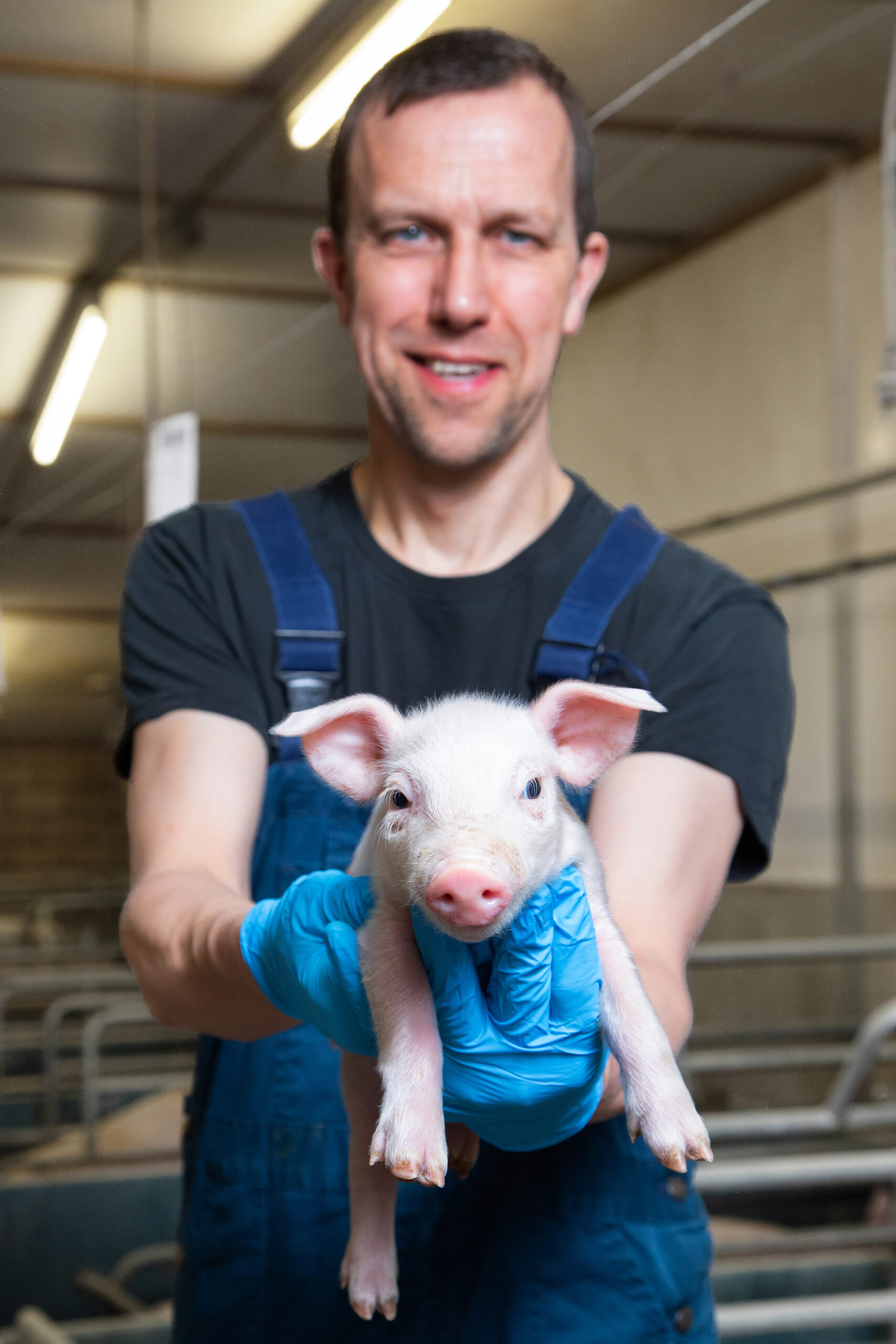Pig farm Sanvar Oirlo BV trains employees for AB Werkt’s pool of temporary workers. Here, migrant workers learn the ins and outs of the trade and can therefore be more easily given tasks at other companies. After all, it is becoming increasingly difficult to find and retain personnel. “If you give someone a range of things to do instead of just the boring or unpleasant jobs, they stay longer,” says owner Han van de Sande.
At Sanvar, the new employees are introduced to all aspects of pig farming. “We teach them the basics in just two weeks,” says Han. “For example, checking and vaccinating piglets, feeding the pigs, and cleaning the pens. They also learn about birth care, weaning piglets, tail docking, assigning identification and registration numbers, and castrating piglets.” Han believes in giving new employees a variety of tasks to do and showing them everything that goes on in a pig farm.
No boring and monotonous work
“You often see companies employing migrant workers to do the monotonous, boring jobs,” he explains. “They spend the whole day cleaning stables, for example. It’s hardly surprising that people turn round after a while and say: ‘I’ve had enough, I’m not doing that anymore, I’m off’. We want to teach and show them many different things and let them experience those things. Then they can soon start helping out at other companies. And they don’t have to spend all day doing the same boring job.”
A fair shot

Good relationship with AB Werkt
Pig farmer Sanvar has been collaborating with AB Werkt for many years. It all started when Hans’ parents still owned the company, which was located in Best at the time. One of the two permanent employees is currently employed by AB Werkt. “We have a good relationship with AB Werkt,” says Han. “Everything runs smoothly, and things are going well. If they have people for the pool of temp workers, they get in touch. The migrant workers do have to speak either English or German, though.”
Two ‘pig-free’ days
New employees for the pool of temp workers can’t start learning at the company right away, however. Sanvar is a specific pathogen free (SPF) farm, which means that the 850 sows and 1,100 fattening pigs are free of certain pathogens. To keep it that way, strict rules apply. For example, you first have to shower before coming into contact with the pigs, and you must not have been in contact with other pigs for 48 hours before entering Sanvar’s farm. That also applies to the new temp workers. So, they sometimes have to wait a few days before they can get started.
Healthy pigs yield more
Han is proud of the high health status of his farm. “Our pigs are healthier, and they get sick less often. And if they ever do get the flu, they recover much faster because they have much higher levels of resistance.” Han’s pigs also need fewer antibiotics. “Good health is not only better for the pigs,” he says. “It’s also much better for us. Our pigs grow better, there is little disease, and there is less mortality. So it costs us less money, time, and energy. Healthy pigs simply make work more enjoyable. And they yield more, of course.”
Stumbling block
But it’s not all plain sailing; sometimes the strict rules can be a stumbling block. Lorries can only load piglets and pigs on Mondays, for example, because they too must have been ‘pig-free’ for 48 hours. The same applies to veterinarians and feed consultants; they also have to wait two days before they can access the farm. “Yes, that can be a problem. But the disadvantages really don’t come close to outweighing the advantages of having healthier pigs,” says Han.
Plans for the future
Han moved the pig farm to Oirlo nine years ago. During the construction process, he took into account the health risks for the pigs. All the work is done inside, and ‘strangers’ can only access the front of the site, not the pigsty. His pigsty has two floors with a lift for the animals. In a few years’ time, Han would like to expand once again by adding a few more sows. And in the distant future? “One of my daughters is thinking about maybe taking over the farm later on,” he smiles. “That’s a real possibility.”
Pig facts
- The gestation period of a sow is 115 day
- A sow gives birth to 15.5 piglets on average
- Sometimes they give birth to more than 20 piglets
- A piglet is weaned (separated from its mother) after four weeks
- A piglet weighs 25 kg after 10 weeks
- A pig is ready for slaughter after 3.5 months
- A fattening pig weighs about 120 kg before slaughter